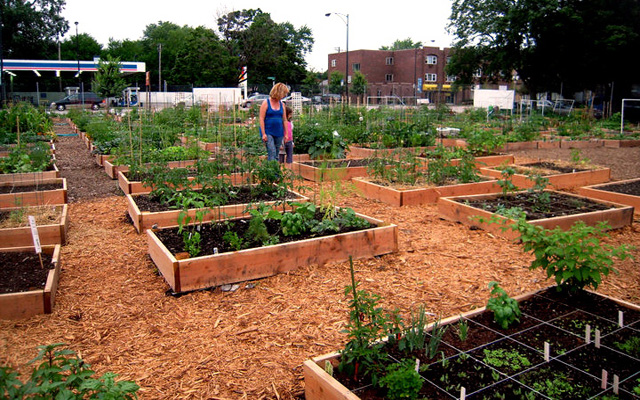
The year 2016 marks the 10th annual Greenovate Boston Awards – a decade of climate action leadership in the City of Boston! Check out our latest featured blog series Where Are They Now? to catch up with some of the winners since they were recognized.
On Friday, April 22, Mayor Walsh will honor this year’s Greenovate Award Winners at Fenway Park. It marks a DECADE of Greenovate Awards, and leading up to this year’s ceremony, we’re taking a look back at the amazing individuals and organizations who have won the award over the years. These individuals and organizations have demonstrated a commitment to sustainability and exemplify the type of creativity it will take for Boston to achieve its climate goals.
Boston Latin School is serious about securing local food for its community. And by local, we mean really local. Since 2013, students of BLS have operated a self-contained hydroponic farm right on school grounds – in a recycled shipping container. The 320 square-foot space was provided by a company called Freight Farms, and uses LED lights and a closed-loop hydroponic watering system to grow up to 4,500 plants at a time.
Because of its controlled light, temperature, and water conditions, the BLS Freight Farm provides a consistent supply of food to the BLS community regardless of what is in season in the rest of the world. Greenovate honored the BLS Freight “Farmly” in 2015 for its innovative approach to sustainable food and its commitment to educating the Boston Latin community and the city at large about the environmental impact of food production.
Since then, the program has grown from 12 students to 27, and its young farmers-in-training have improved the Freight Farm’s infrastructure, seen increased annual harvests, and have worked with BPS Food and Nutrition Services in order to eventually serve the food they grow in their cafeteria. They have also developed their educational and outreach programming through increased social media presence, development of educational videos, and healthy food resources in the school.
We reconnected with Cate Arnold, BLS instructor and faculty advisor for the Freight Farm to learn more about the farm and what schools can do to teach the environmental impact of food production.
How has the Freight Farm and your outreach programs evolved in the last year?
The Freight Farm at Boston Latin School is definitely a work in progress and we are very pleased to report that we’ve been making steady gains since students started operating the farm last year. In the 2014-15 school year we had about 12 students who consistently worked in the farm mostly juniors, and seniors. We accomplished a lot in the first year, including painting a mural on the farm, getting trained in how to operate the farm, and having at least three harvests of leafy greens (lettuce, basil and kale) that were given away to members of the BLS community. We organized and held a meeting with BPS Food and Nutrition Services Staff to present them with our Food Safety Protocol plan in the hopes of eventually getting permission to serve the food we grow in the farm in our cafeteria. Students also launched our Freight Farm website.
27 [students] now regularly work in the farm, some several times a week. This year we have student farmers who represent all grade levels at BLS (7-12) so there is a much broader range of students who are engaged in the farm. We recently launched our Facebook page and Instagram account (@blsfreightfarm), and work is underway on our draft of a CSA brochure, a program we hope to get up and running before the end of the year. We have harvested numerous times already this year, and offered tours of the farm to visiting groups from Catholic Memorial, Madison Park, Northeastern University, and Genesee Community Charter School in Rochester, NY. We have also donated some of this year’s harvests to First Church Jamaica Plain’s Food Pantry on a couple of occasions. We have expanded what we are growing this year to include spinach, flowers, mustard greens, and even some beans.
What do you want Boston students to know about the environmental impact of food production?
BLS Freight Farm students have worked hard to educate themselves and the larger community about the fact that it matters how and where their food is produced. It matters where food is grown from an economic and social justice standpoint because local agriculture better supports local economies and helps makes healthy food available in communities in ways helps combat food deserts and address food insecurity issues. It also matters where food is grown in terms of environmental and sustainability considerations because reducing the distance it takes to bring food to your plate reduces the fossil fuels used to transport it, decreasing your carbon footprint and fossil fuel driven climate change. It matters how food is grown as well. Food produced through big agribusiness causes dangers both to the environment and to human health, often polluting air, water and soil, reducing biodiversity, treating workers poorly, and contributing to global climate change. The Freight Farm grows food in a way that is energy efficient, and doesn’t use dangerous pesticides, which is important environmentally and for human health. The Freight Farm also helps educate about and promote the health and environmental benefits that come from eating more fresh, leafy greens.
We are proud to be growing leafy greens, because environmentally and in terms of overall human health, Americans are currently producing and consuming way too much meat. It’s not environmentally sustainable. It takes much more energy to grow food to feed the animals we eat than it takes to grow food to feed ourselves, and it’s as not healthy to eat a diet heavy in meat. Studies suggest eating more plant-based foods can reduce the risk of cancer, heart disease, diabetes, obesity, and increase longevity. In addition, factory farm raised animals are routinely given antibiotics to keep them healthy, which has the harmful effect of producing antibiotic resistant bacteria that can easily spread to animals and humans.
The Freight Farms focuses a lot on sustainable food advocacy. Has the community been receptive to the message?
The BLS Freight Farm is constantly working to share what we are learning with others. We maintain a website, post regularly to our Facebook page (like us @Boston Latin School Freight Farm!) and we offer tours to anyone who asks. Nevertheless, it’s always a challenge for full-time students to do all of the work in the farm and still find time to do as much outreach as we would like to do. We would like to be writing a regular blog and sharing updates about the farm in our school’s daily bulletin and alumni newsletter on a regular basis, something that at present still only happens occasionally. Some of the best outreach we’ve had in our own school is students walking around during the school-day with bags of leafy greens that were harvested a period earlier by their student farmer peers. There’s nothing like the smell of fresh basil wafting through an Algebra I class to generate new questions and interest in the farm! We’re still new as an enterprise at BLS. We are very optimistic given the consistent interest people have shown in the farm once they learn a bit about it, that our message and impact will continue to grow.
What do schools need to do in order to understand and improve their environmental impact, when it comes to food?
The best way to understand and improve your environmental impact when it comes to food is to try to educate yourselves and your peers in ways that are fun and compelling. There’s a ton of great information out there, and it’s all pretty interesting…some of it even shocking. The aim is to inform yourselves, and then make your case well enough to others that it inspires the kind of change you are hoping for. The first step for students at BLS was simply to decide to focus on food. Everyone likes food. Everyone is interested in food and cares about food. We started by planting raised beds in front of our school, and then sharing some of the produce we grew at school-wide events like salad parties that were used as an opportunity to educate at the same time. We made educational videos and launched popular features like a school salad bar, and initiatives like a farm-to-school program that was promoted with t-shirts, and a food fashion show, and students dressed as green beans. We hosted food fairs, held food poster competitions and school lunch menu contests, and we focused on recycling, composting, and waste-free lunches.
Every improvement helps. It’s important to keep in mind that making these kind of changes in thinking and behavior is an ongoing process because there are always new things to learn and there are always the next generation of students who will need to learn about the issues all over again. That’s why we try to make institutional changes and put systems in place that will last long after the individual students who started them have graduated. It’s also really key to get buy-in and support from your school administration if you can. Lastly, don’t hesitate to reach out to others who have done things you’d like to try. Most of the folks doing this kind of work are more than willing to share their ideas and tips with others.
The learn even more about the BLS Freight Farm, check out this video, in which BLS students describe what it takes to keep the Freight Farm up and running!


Recent Comments